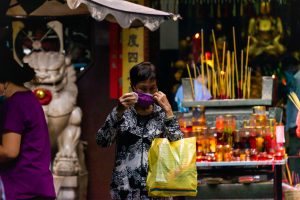The Communist authorities in Vietnam risk becoming increasingly marginalized after failing to curb the spread of COVID-19. Civil society groups are now taking the initiative in combating the pandemic amid harsh lockdowns in the country’s south.
Sources in the southern capital of Ho Chi Minh City (HCMC) say doctors, nurses, citizen journalists, hospital volunteers, and religious groups were organizing themselves online and on the ground, where patient care and food distribution are badly wanting.
“The situation really took a tailspin downwards after remarkable containment efforts,” said a business analyst. “It’s bad in HCMC, ambulance drivers driving around with patients dying because no one is accepting them because hospitals are full.”
Vietnam has recorded about 115,000 COVID-19 cases and 524 deaths, mostly in the south, with more than 62,000 cases confirmed in HCMC alone. Nearly all of Vietnam’s case were reported in the past month.
“I am quite confident the numbers are not under reported, they have been very transparent,” the business analyst said. “The Delta variant, it’s relentless… The vaccine rollout is dismal.”
Among the broader issues is a lack of trust in state-run media, which for more than a year was reassuring about official efforts to curb the disease when case numbers and transmission rates remained relatively low.
But the government’s failure to order and stockpile vaccinations from abroad and the outbreak of the potent Delta variant has eroded confidence in a system known for barking orders and retaliating against complaints.
Just 0.4 percent of Vietnam’s 96.5 million people have been fully vaccinated, with 4.5 percent receiving their first jab. In neighboring Cambodia, which is less developed, 27.5 percent of the population have been fully vaccinated and 41.5 percent have had their first shot.
Travel restrictions were announced in May and a full lockdown imposed a month ago.
In HCMC, a 6 p.m. to 6 a.m. curfew was put in place on Monday. State media is quoting Mayor Nguyen Thanh Phong as saying police patrols would be stepped up and offenders slapped with appropriate penalties, even detention in cases of resistance.
But like Cambodia, which endured similar measures in April and May, authorities in Vietnam, including the military, will find lockdowns are almost impossible to enforce.
Overpopulated cities and slums of the developing world are filled with people who simply don’t enjoy the same access to space, supermarkets, and health facilities as in the West. A lack of home refrigeration means people rely on fresh food markets for each day’s meals.
“People are struggling here, and starvation is happening due to the lockdown in Saigon,” said a volunteer, using the old name for Ho Chi Minh City. “The government does not help but instead fines the people who are trying to help,” she added, describing the growing role of civil society organizations (CSO).
That includes “brave doctors who raise their voice and criticize the government and its stupid policies,” she said, adding “Vietnamese people do not trust mainstream media much anymore, but they do follow doctors who have influence on social media.”
She said one recent start-up online group had attracted about 260,000 members in its first week and was offering free consultations with doctors and professional health care workers.
It was also being used as a discussion channel and for food distribution, where hungry people can get access to free vegetables and other food, “and kids can get free milk.”
That sort of unsanctioned self-help has never sat well with officials in faraway Hanoi, from where absolute authority is exerted, often matched by equal doses of paranoia.
But there are signs of a sympathetic hearing among some in the bureaucracy.
In what was described as an unprecedented gesture, Christian and Buddhist groups have combined to enlist and coordinate volunteers working in HCMC hospitals.
“This is astonishing,” the CSO volunteer said. “For the first time, the government has allowed them to do that.”
Luke Hunt can be followed on Patreon and on Twitter @lukeanthonyhunt

































